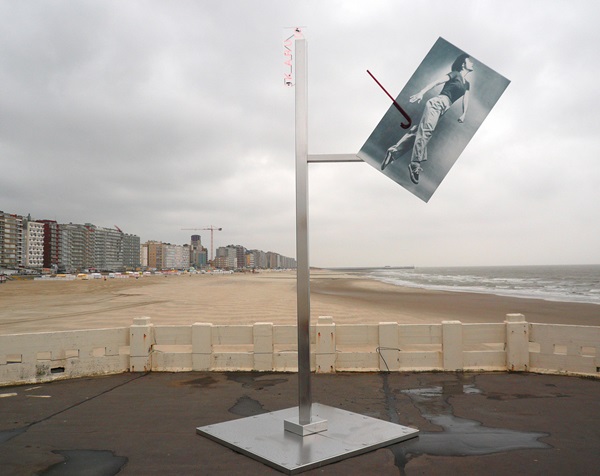
Image: Courtesy of the artist and Anton Kern Gallery, New York.
This summer, seven artists will place sculptures around City Hall Park, as part of a new show from New York’s Public Art Fund. “Image Objects,” on view June 30–November 20, 2015, will feature work from Alice Channer, Lothar Hempel, Jon Rafman, Amanda Ross-Ho, Timur Si-Qin, Hank Willis Thomas, and Artie Vierkant.
artnet News took a walk-through City Hall Park with Public Art Fund associate curator Andria Hickey to learn more about the exhibition. City Hall Park is a perennial Public Art Fund exhibition site that most recently hosted Danh Vo’s We the People.
The jumping off point for Hickey’s curatorial process was the overwhelming response to this past spring’s Clouds, a cheerful blue cloud sculpture Olaf Breuning created for a Public Art Fund project in Central Park that became something of an Instagram sensation.
“I’ve been observing how public art has been disseminated online through social media platforms which allow the objects to take on a new life in a public context,” explained Hickey.
Inspired by this digital afterlife, she assembled a group of sculptures created by artists who are already thinking about the relationship their work has with social media. Specifically, Hickey has chosen sculptors who incorporate digital imaging technology and fabrication into their practice, so that a digitally-conceived image becomes a physical object, only to become an image again, shared on Facebook or Instagram.
Amanda Ross-Ho’s The Character and Shape of Illuminated Things, for instance, is a new take on a piece recently displayed at the MCA Chicago. The artist noticed that the three piece sculpture, based on images from an old photography handbook, was tricking facial recognition software into thinking it was a person. In its new iteration, the sculpture, of a cube, a sphere, and a mannequin’s head, features a neon green square framing the face, a physical manifestation of the technology found in digital cameras or Facebook.
“All of the objects in the show have a really uncanny nature,” Hickey noted. “The idea of ‘synthetic’ has really changed over the past few decades.” She likes the idea of park visitors pausing to examine each of the pieces to see if they are real or fake.
At the south entrance to the park, the gate will be flanked by two marble busts from Rafman’s “New Age Demanded” series, “stationed like how traditional lions will greet you,” as per Hickey.
The statues are the artist’s take on traditional statuary, which he has warped and distorted using 3-D image software. Both pieces have been carved by laser, allowing Rafman to create wildly imaginative shapes that would have been impossible to carve by hand.
The other works will be distributed throughout the park, ready to greet visitors in front of the central fountain or as they travel along the winding paths. “Each of the lawns kind of functions as a little gallery” said Hickey.
On this particular morning, Hickey was focused on one lawn in particular, working with Channer to figure out the best way to display R O C K F A L L, a seven-piece sculpture which is currently on view at at Colorado’s Aspen Art Museum through the end of the month before it’s shipped to New York to join the show.
The work is based on pieces of concrete rubble sourced from London construction sites that Channer scans, digitally stretches and manipulates, and casts in concrete, chrome, and Cor-ten steel. The artist described the work as a “horizontal rock fall” and “a human-made version of a natural phenomena.” “It’s sculpture that is an event,” Channer added.
In Aspen, R O C K F A L L is displayed on a backdrop of mountains. Here in New York, the city’s skyscrapers will provide an equally monumental setting, that will explore the work’s inherent tension between the natural and the man-made.
Even though the official unveiled is a month away, curious viewers can get a bit of a sneak preview this week: “All of these artists will have a big presence at Frieze,” noted Hickey.
“Image Objects” will be on view in New York’s City Hall Park in Lower Manhattan, June 30–November 20, 2015.